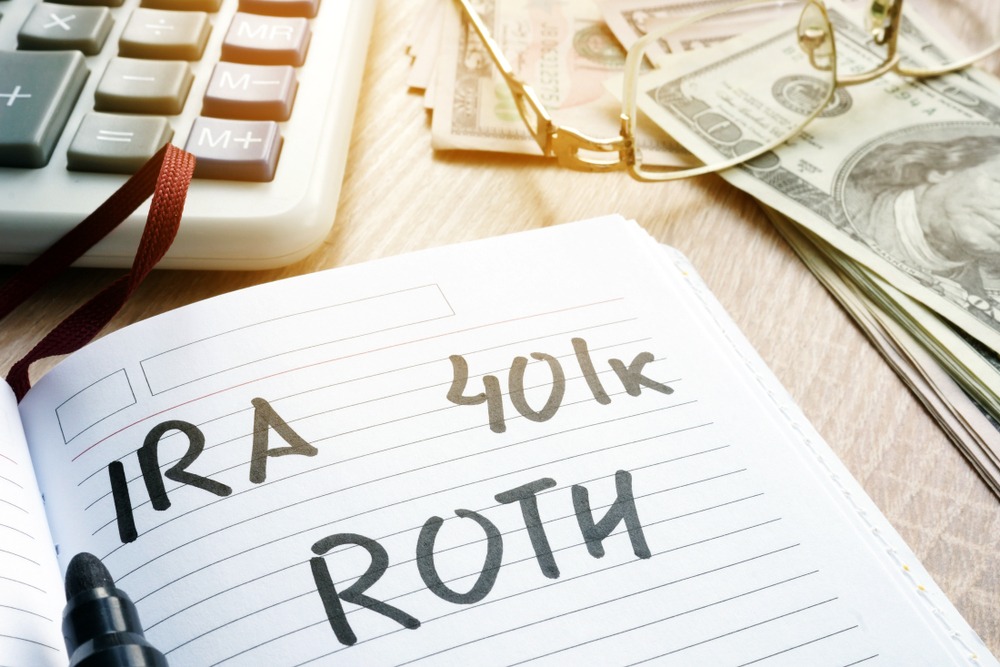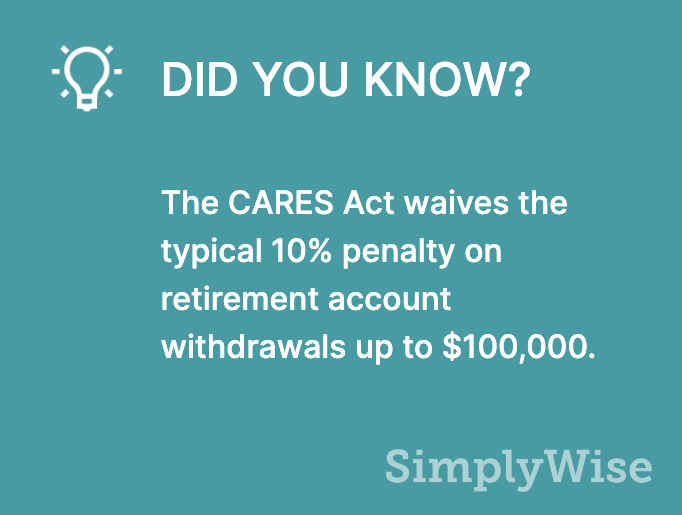
The CARES Act (Coronavirus Aid, Relief, and Economic Security) Act passed March 27 is more widely known right now as the “stimulus check bill”. The legislation is meant to provide relief to Americans whose employment and savings has been impacted by the COVID-19 pandemic. Indeed, those individual stimulus checks are badly needed. A recent SimplyWise survey found that 40% of Americans’ income has been lost or reduced due to the virus. And 43% of those who have lost their jobs are not confident they will be employed in the next three months.
But what is not as widely known about the new legislation is that it also provides other forms of financial support by giving greater access to the cash in your retirement account – for example, by relaxing withdrawals from your 401k.
Most people, particularly younger people, might miss this 401k coronavirus relief. Our survey found that 50% of people over 60 years old planned to draw from their retirement accounts to fill their income gaps right now. But of respondents between 18-60 who are feeling financially strapped, just 15% planned to tap their retirement accounts.
Yet while the retirement-related provisions of the CARES Act may be buried in the stimulus check news, the new law in fact makes it easier – and less costly – to use your retirement accounts for cash today. Understanding the new options can potentially help with your finances right now. However, it’s important to consider your retirement savings for your future as you do. Below we outline what the CARES Act offers with regards to your retirement savings.
Tax-favored withdrawals from your retirement plan
Normally, withdrawing from your 401k or other retirement account before you are 59 ½ years old results in a 10% penalty on the amount taken. But these aren’t normal times.
Recognizing that people may need to draw on their retirement savings right now, the CARES Act waives that 10% penalty on withdrawals up to $100,000 for distributions made to an individual throughout all of 2020.
The withdrawn amounts can be repaid to the retirement plan or IRA over a three-year period, in one or more installments, at any time. Those repayments will be treated as a tax-free rollover, and will not be subject to the annual contribution limits of your plan.
Distributions not repaid within the three-year period can be taxable income – however the amount can be included in your income and taxed ratably over three years.
Now with regards to eligibility for these tax-favored withdrawals, there are a couple of important points.

First, these coronavirus-related distributions apply to 401(k), 403(b), and governmental 457(b) plans. Second, they are technically restricted only to people who are deemed to be “affected individuals” by the Coronavirus. To qualify, individuals must fall within one of two main categories:
- You, your spouse or your dependent have been diagnosed with COVID-19 by a CDC-approved test, or
- You have experienced adverse financial consequences related to COVID-19, as a result of:
- being quarantined;
- being furloughed, laid off, or having your work hours reduced;
- being unable to work due to lack of child care
- being unable to work due to closures or reduced hours related to the current pandemic.
- other factors as determined by the Secretary of the Treasury
Loans from your retirement plan
Normally, the limit for loans from a qualified retirement plan is $50,000. The CARES Act allows for loans up to the lower of $100,000 or 100% of the participant’s account balance . These loans will be available only from March 27, 2020 (the date of the bill signing) through September 23, 2020.
In addition, for loans from qualified retirement plans that are due between March 27, 2020 and December 31, 2020, the payment due date will be delayed one year.
Waiver of required minimum distributions
For individuals who participate in retirement plans or own an IRA, tax rules typically demand they take a required minimum distribution (RMD) from their retirement plan, starting April 1 of the year they turn 70 ½.
However, the CARES Act temporarily waives those RMDs throughout 2020. This means that anyone who has already begun taking RMDs, or who was required to begin taking them in 2020, will now have their RMDs waived for the remainder of this year.

Translation? Retirees will not be forced to liquidate their investment accounts at a time of extreme market volatility.
The CARES Act also extends the period over which distributions must be made due to an employee’s or IRA owner’s death by one year.
And unlike the retirement savings withdrawals, this RMD waiver applies to everyone. It is not restricted to individuals who have been affected by COVID-19.
Should I take a 401k loan or withdrawal?
The decision about taking a loan or withdrawing from your 401k or other retirement account is important to consider carefully, as it can impact your future. Some financial advisors recommend that a loan is a better alternative to a payment withdrawal. Others say that taking money from your retirement savings essentially means borrowing from your future self, because the cash you take out won’t have the opportunity to grow and compound over time. If you do decide to tap your retirement savings, it may be prudent to first review your plan and financial situation with a financial advisor.
Takeaways
This is a difficult time for many Americans, many of whom are quarantined alone in their homes and suffering from isolation and cabin fever. Use the time you have at home to educate yourself about all of the options that you have for your current financial situation. Wherever possible, speak to a financial advisor before making a decision like withdrawing from your 401k account that could impact your future savings and retirement.
Above all, in spite of today’s uncertainty, it’s important to remember not to lose sight of your long term goals. Saving and retirement planning is something you do for life, from managing your investments, to maximizing your Social Security income (earned, spousal and widow’s benefits), thinking about late-in-life work opportunities, and tax planning. Fortunately, there are plenty of resources online to help you prepare, so that when this crisis is over, you can get back to living your life.